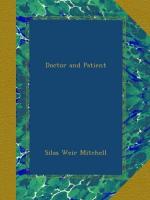It is, however, the moral aspects of life which will trouble her most. The cares which once were easily shaken off stick to her like burrs, and she carries them to bed with her. I have heard women say that men little know the moral value to women of sewing. It becomes difficult when people are nervous, but this or some other light handiwork is then invaluable.
By this time she has learned that her minor, every-day duties trouble her, and when about to meet them, if wise, she will put herself, as we all can do, in an attitude of calmness. This applies still more forcibly to the larger decisions she must so often have to make as to children, house, and servants. Worry, as I have elsewhere said, is as sand in the mental and moral machinery, and easily becomes a mischievous habit. We can stand an immense deal of work, and can, even if weak, bear much, if only we learn to dismiss small questions without worry or unreasonable reconsiderations. As concerns temper, we constantly prepare ourselves to meet even just causes of anger, and thus by degrees learn more and more easily, and with less and less preparation, to encounter tranquilly even the most serious vexations. In health, when not nervous, a woman well knows that there are seasons when she must predetermine not to be nervous; and when ill-health has made her emotional, she must learn to be still, more constantly on guard. Above all, it is the small beginnings of nervousness which she has to fear.
Tears are, for the nervous woman, the seed of trouble. Let her resolutely shun this commencement of disaster. The presence of others is apt to insure failure of self-control. A word of pity, the touch of affection, the face of sympathy, double her danger. When at her worst, let her seek to be alone and in silence and solitude to fight her battle. Fresh air, a bath (if she can bear that), even the act of undressing, will often help her. I once quoted a valued friend as saying that “we never take out of a cold bath the thoughts we take into it,” and the phrase is useful and true.




